Jun 26, 2019
“Defunding the programs that protect vulnerable people’s human rights and meet their basic needs is a nonsensical approach to combating trafficking,” said Shawna Bader-Blau, the executive director of the Solidarity Center, a global workers rights organization that operates in 60 countries and has been affected by the Trump administration’s decisions.
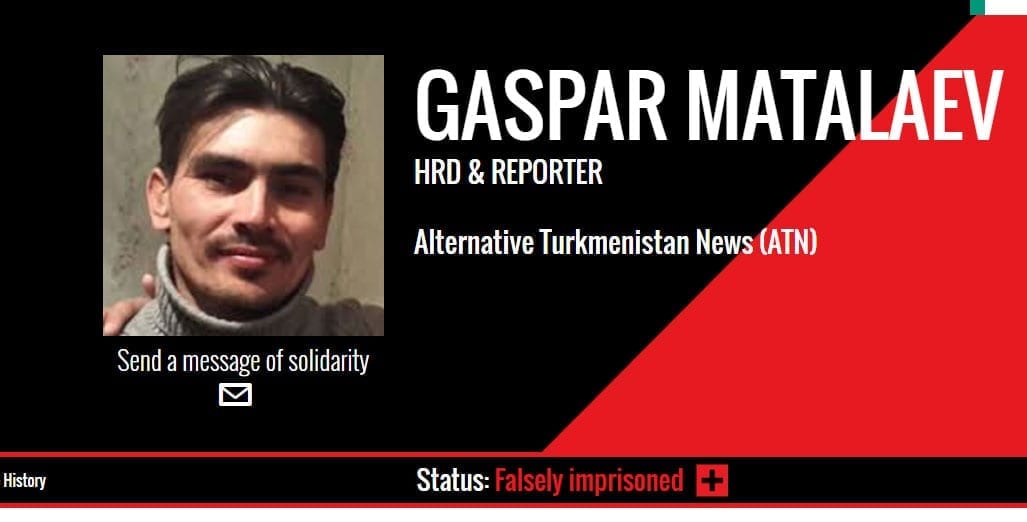
Jun 25, 2019
Belarus, Burundi, Mauritania, Russia, Saudi Arabia, South Sudan and Turkmenistan are among the 22 countries with the worst human trafficking records in 2018, according to the U.S. State Department’s annual Trafficking in Persons Report.
The report notes that for the first time, a majority of victims in 2018 were trafficked within their countries of citizenship, especially in cases of labor trafficking.
In Turkmenistan, where the government “continued to engage in large-scale mobilizations of its adult citizens for forced labor in the annual cotton harvest and in public works projects, no officials were held accountable for their role or direct complicity in trafficking crimes,” according to the report.
Further, the report states that “the continued imprisonment and abuse of an independent observer of the cotton harvest and state surveillance practices dissuaded monitoring of the harvest during the reporting period.”
Gaspar Matalaev, a labor rights activist with Turkmen.news, who monitored and reported on the systematic use of forced adult labor and child labor in Turkmenistan, remains falsely imprisoned since 2016, days after Turkmen.news published his extensive report on the country’s forced labor practices.
He has been tortured with electric shocks and held incommunicado, according to the Cotton Campaign, a coalition of organizations, including the Solidarity Center, working to end forced labor in the cotton fields. (Send a message to the Turkmenistan government to immediately release Matalaev.)
Uzbekistan, another country with vast, state-sponsored forced labor in the cotton fields, remained on the watch list, a ranking indicating more progress by the government than in Turkmenistan. Although the Uzbekistan government has made strides in ending forced labor, public-sector employees continue to be coerced into a variety of construction and municipal service work, as documented in a recent report by the Solidarity Center and the Uzbek-German Forum for Human Rights (UGF). In addition, at least 175,000 people were forced to harvest cotton in Uzbekistan’s 2018 harvest.
Migrant Workers Vulnerable to Exploitation, Trafficking
The Trafficking in Persons report also details how labor recruiters often act as human traffickers, taking advantage of migrant workers who lack information on the hiring process, are unfamiliar with legal protections and options for recourse, and often face language barriers.
“Certain unscrupulous recruitment practices known to facilitate human trafficking include worker-paid recruitment fees, misrepresentation of contract terms, contract switching, and destruction or confiscation of identity documents,” the report states.
The report continues: “Low-wage migrant laborers are extremely vulnerable to and at high risk of exploitative practices such as unsafe working conditions, unfair hiring practices, and debt bondage—a form of human trafficking.”
Each year, the State Department ranks countries in one of four tiers, basing its assessment primarily on the extent of governments’ efforts to meet the minimum standards for the elimination of human trafficking outlined in the U.S. Trafficking Victims Protection Act (TVPA). Countries at the bottom, Tier 3, fail to show they are making any effort to end human trafficking.
The State Department has issued the report annually since 2001, following passage in Congress of the TVPA in 2000.
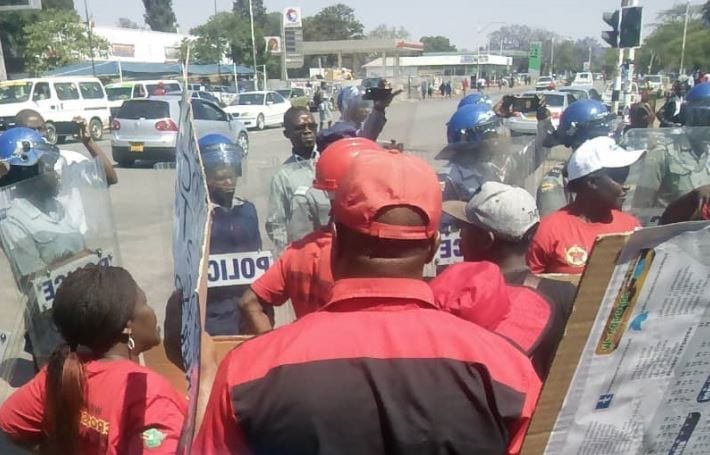
Jun 19, 2019
The number of countries that exclude workers from the right to form or join unions increased from 92 in 2018 to 107 in 2019, and 80 percent of countries deny some or all workers collective bargaining rights, according to the International Trade Union Confederation’s Global Rights Index 2019 released today.
“Democracy is in crisis, as governments continue to roll back workers fundamental rights,” ITUC General Secretary Burrow said at a press conference releasing the report today in Geneva. “But our solidarity and defense of workers is also unprecedented.”
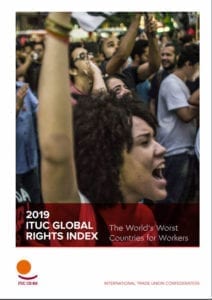 The report documents escalating repressive actions against workers worldwide as part of a global environment in which democracy is being increasingly restricted.
The report documents escalating repressive actions against workers worldwide as part of a global environment in which democracy is being increasingly restricted.
In addition, the report finds:
- Union members and leaders were murdered in 10 countries: Bangladesh, Brazil, Colombia, Guatemala, Honduras, Italy, Pakistan, the Philippines, Turkey and Zimbabwe.
- 85 percent of countries have violated the right to strike.
- Workers had no or restricted access to justice in 72 percent of countries.
- Authorities impeded the registration of unions in 59 percent of countries.
- The number of countries where workers are arrested and detained increased from 59 in 2018 to 64 in 2019.
“The three global trends for workers’ rights identified in the 2019 Global Rights Index show that democracy is in crisis, governments are attempting to silence the age of anger through brutal repression, but legislative successes for workers’ rights are still being won,” the report states.
‘We Will Claim Our Rights!’
Speaking at the press conference, Bernice Coronacion, senior leader of the union federation SENTRO in the Philippines, choked up as she recounted the violent escalation against union members there, including the murder of a union leader.
“Trade union work very dangerous in the country,” she said. “We don’t just need good rights on paper for workers, we need them to be actualized. And we will claim these rights!”
The Philippines is among the 10 worst countries for workers’ rights in 2019, according to the report. The others are Algeria, Bangladesh, Brazil, Colombia, Guatemala, Kazakhstan, Saudi Arabia, Turkey and Zimbabwe.
But the report makes clear that worker rights are endangered across the spectrum: The greatest increase in the number of countries excluding workers from the right to form unions occurred in Europe, where 50 percent of countries now exclude groups of workers from the law, up from 20 percent in 2018.
Also speaking at the press conference, Vagner Freitas, president of the Central Union of Workers (CUT) in Brazil, said although the rights of women workers are being rolled back, “women have been at the forefront of the struggle against these anti-democratic actions against women workers and women in our country. We will restore democracy in Brazil.”
The ITUC Global Rights Index 2019 ranks 145 countries against 97 internationally recognized indicators to assess where workers’ rights are best protected in law and in practice. The ITUC has been collecting data on violations of workers’ rights to trade union membership and collective bargaining around the world for more than 30 years.
Read the full report.
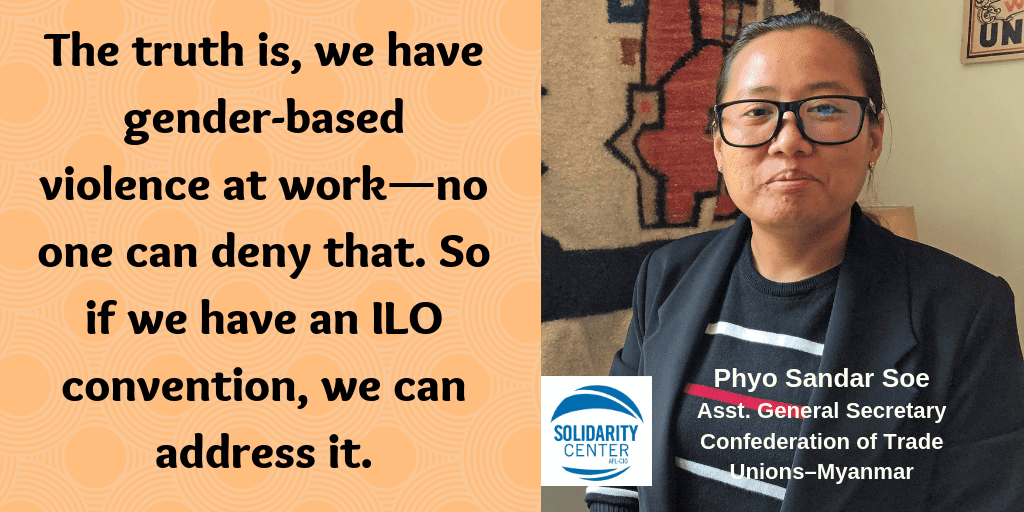
Jun 12, 2019
Workers and their unions are starting discussions this week on a global standard that would address violence and harassment in the world of work. They join representatives of employers and governments at the June 10–20 International Labor Conference (ILC) in Geneva, where they are championing an International Labor Organization (ILO) convention with a strong focus on gender-based violence (GBV) and harassment.
“We cannot deny that we have gender-based violence at work, so if we have an ILO convention, we can address it,” says Phyo Sandar So, assistant general secretary of the Confederation of Trade Unions–Myanmar (CTUM), a Solidarity Center partner. She says a global convention would enable union activists and their allies in countries like Myanmar to advocate for more protective laws and ensure their enforcement.
“We do not have a strong domestic law for violence at workplace,” she says. “When we make a policy for gender-based violence at work, we need to have international standards to make our own legislation, see how other countries implement it to make a law.” Sandar will be among workers at the ILC, where her CTUM union sisters will be at the negotiating table.
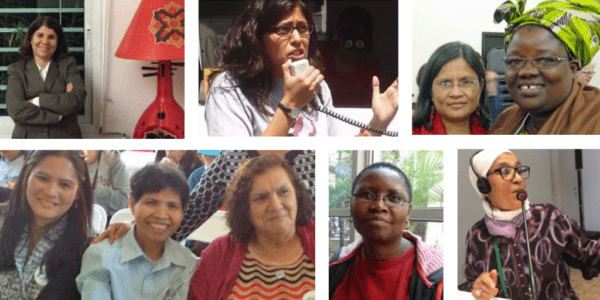
Among women union activists who have championed an end to GBV at work (from top, left): Tourya Lahrech; Alejandra Ancheita; Lily Gomes and Oretha Tarnue; May Joy Guarizo Salapare, Phobsuk Gasing and Myrtle Witbooi; Gertrude Mtsweni; and Saida Bentahar. Credit: Solidarity Center
Final negotiations on an ILO convention covering gender-based violence at work comes after more than a decade of work by women in the global labor movement. Women like Rose Omamo, general secretary of the Amalgamated Union of Kenya Metal Workers, a Solidarity Center partner.
“Women were going through serious sexual harassment at the workplace without knowing what to do about it. There were no gender champions who would campaign against GBV as compared to now that we are seriously campaigning against GBV at workplace,” she said.
In 2015, as a result of these efforts, the ILO agreed to craft a standard on ending violence and harassment against men and women in the world of work, and workers have been at the table helping shape it ever since. Their years-long effort has been supported by the International Trade Union Confederation, Solidarity Center and unions and organizations around the world.
Workers, Unions: Educating, Mobilizing for a GBV Standard

Members of COSATU were among union members across South Africa taking part in #TotalShutdown day last fall to protest violence against women. Credit: COSATU
In February 2019, the ILO released the most recent draft of the proposed convention, “Ending Violence and Harassment in the World of Work,” which builds on high-level discussions in spring 2018 among representatives of workers, government and business.
Leading up to the final discussions happening now in Geneva, Solidarity Center partners urged their unions, governments and employers to publicly support a binding ILO convention on violence and harassment at work that covers gender-based violence.
For instance, the Georgian Trade Unions Confederation (GTUC), together with other civil society organizations, helped push the adoption of a law that includes a definition of sexual harassment at the workplace, and designated the Public Defenders’ office as a state body responsible for the enforcement of new legislation.
“Trade unions in the Eastern European region have applied multiple approaches to secure support for the convention,” says Paata Beltadze, Solidarity Center regional gender specialist in Tbilisi.
“Unions increased awareness about the standard-setting procedures and importance of the convention to members; built alliances among civil society and human rights groups at the local and international levels; and organized regional workshop to share experiences, strategies and developing plans for a strong regional networking in the future,” says Beltadze.
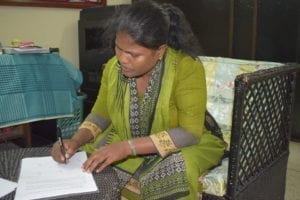
Sritee Akter from the Garment Workers Solidarity Federation in Bangladesh, signs a letter to the prime minister urging government support of an ILO convention on gender-based violence at work. Credit: Solidarity Center/Istiak Inam
In Bangladesh, trade union federations and worker organizations representing garment workers and domestic workers sent a message to the government urging the administration to support the convention. Nine Solidarity Center partner organizations signed a letter to Prime Minister Sheikh Hasina, making the case for government support for the convention and recommendations.
Omamo, a representative on the gender commission of the Organization of African Trade Union Unity (OATUU), and Gertrude Mtsweni, gender coordinator for the Congress of South African Trade Unions (COSATU), worked with OATUU’s gender commission to develop an effective message to urge their governments to ratify the convention after it is passed by the United Nations. Countries are not covered by a UN convention unless their governments ratify it and indicate they are committed to applying its provisions in national law and practice, and reporting on its application at regular intervals. COSATU activists took part in #TotalShutdown rallies last fall to protest violence against women.
These are just a sample of the education, mobilization and advocacy workers and their unions have undertaken in the weeks and months before the ILC.
“Unions today are uniquely positioned to enable workers to overcome workplace structures that perpetuate the skewed gender power relations at the root of much social and economic inequality,” says Robin Runge, Solidarity Center senior gender specialist.
“Unions provide a means by which working people most impacted by GBV can voice their needs and experiences. In doing so, unions have shown that when front-line workers have a say, solutions addressing deeply rooted problems like GBV effectively address the concerns for those most affected,” she says.
Resources
Two just-released informal surveys union members conducted among their co-workers at garment factories in Cambodia and Indonesia:
Op-ed by Robin Runge in Thomson Reuters
Solidarity Center video on gender-based violence at work:
Solidarity Center Legal review highlighting the need for an ILO convention on GBV.
Find out more about the ILC.
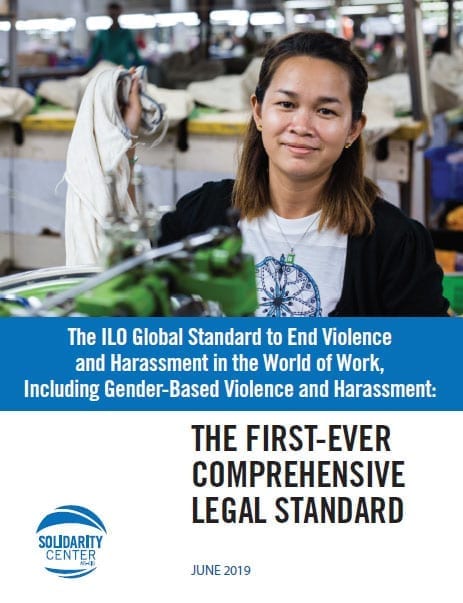
Jun 11, 2019
A Solidarity Center legal analysis shows the proposed ILO convention on gender-based violence and harassment at work is necessary because no global binding instrument exists that comprehensively addresses violence and harassment in the world of work, including gender-based violence and harassment.
Download here.








